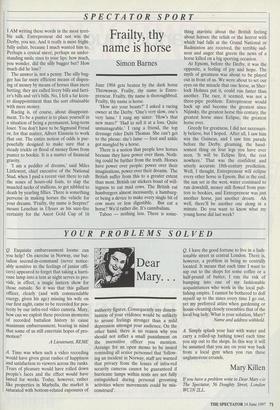SPECTATOR SPORT
Frailty, thy name is horse
Simon Barnes
I AM writing these words in the most terri- ble sulk. Entrepreneur did not win the Derby, you see. And it really is most fright- fully unfair, because I much wanted him to. Perhaps a cynical sneer, perhaps an under- standing smile rises to your lips: how much, you wonder, did the silly bugger bet? How much did he lose?
The answer is, not a penny. The silly bug- ger has far more efficient means of dispos- ing of money by means of horses than mere betting; they are called livery bills and farri- er's bills and vet's bills. No, I felt a far keen- er disappointment than the sort obtainable with mere money.
Racing is, of course, about disappoint- ment. To be a punter is to place yourself in a situation of being a permanent, long-term loser. You don't have to be Sigmund Freud or, for that matter, Albert Einstein to work that out. The entire notion of odds is pur- posefully designed to make sure that a steady trickle or flood of money flows from punter to bookie. It is a matter of financial gravity.
`I am a peddler of dreams,' said Miles Littlewort, chief executive of the National Stud, when I paid a recent visit there to rub the noses of hours-old foals, to slap the muscled necks of stallions, to get nibbled to death by yearling fillies. There is something perverse in making horses the vehicle for your dreams. 'Frailty, thy name is Sceptre!' moans Lenehan in Ulysses as his sure-fire certainty for the Ascot Gold Cup of 16 June 1904 gets beaten by the dark horse Throwaway. Frailty, thy name is Entre- preneur. Frailty, thy name is thoroughbred. Frailty, thy name is horse.
`How are your beasts?' I asked a racing owner at the Derby. 'One's very slow, one's very lame.' I rang my sister: 'How's that new mare?' Had to sell it at a loss. Quite unmanageable.' I rang a friend, the top dressage rider Debi Thomas. She can't get to the phone: she's lame — foot and ankle got mangled by a horse. There is a notion that people love horses because they have power over them. Noth- ing could be further from the truth. Horses have power over people: power over their imaginations, power over their dreams. The British suffer from this to a greater extent than most. British car stickers boast of will- ingness to eat mad cows. The British eat hamburgers almost incessantly, a hamburg- er being a device to make every single bit of cow more or less digestible. But eat a horse? We'd rather die. It's cannibalism.
Taboo — nothing less. There is some- thing atavistic about the British feeling about horses: the relish or the horror with which bad falls at the Grand National or Badminton are received, the terrible sad- ness and anger that greets the news of a horse killed on a big sporting occasion.
At Epsom, before the Derby, it was the opposite, a feeling of joy and hope. The myth of greatness was about to be played out in front of us. We were about to set our eyes on the miracle that one horse, as Sher- lock Holmes put it, could run faster than another. The race, it seemed, was not a three-pipe problem: Entrepreneur would hack up and become the greatest since Nijinsky, the greatest horse this century, the greatest horse since Eclipse, the greatest horse ever.
Greedy for greatness, I did not necessari- ly believe, but I hoped. After all, I saw him win the Guineas, and I saw him parade before the Derby, gleaming, the hand- somest thing on four legs you have ever seen. 'It will be Eclipse first, the rest nowhere.' That was the confident and utterly accurate 18th-century prediction. Well, I thought, Entrepreneur will eclipse every other horse in Epsom. But in the end, the sun set in the west, water continued to run downhill, money still flowed from pun- ters to bookies, and Entrepreneur was just another horse, just another dream. Ah well, there'll be another one along in a minute. Do you want to know what my young horse did last week?










































































 Previous page
Previous page